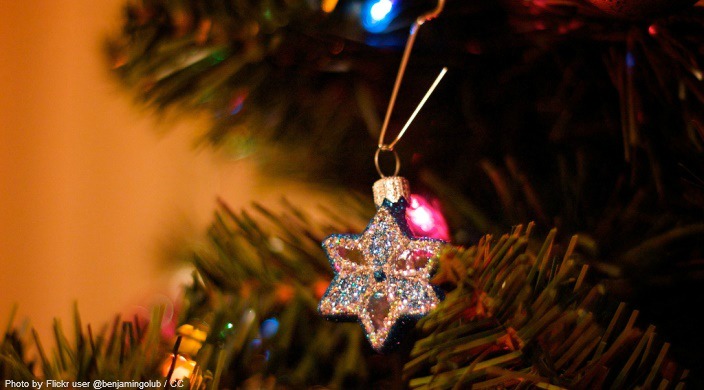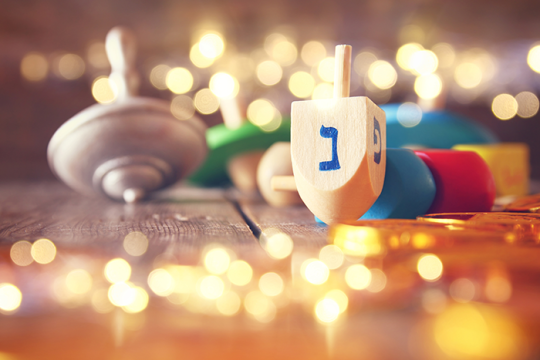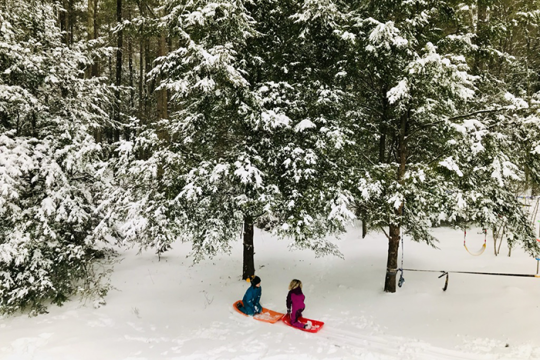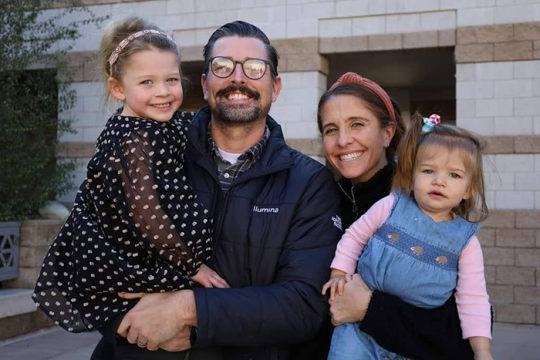
The challenges and contradictions of being a Jew in America are never more obvious than in the month of December. Christmas is unavoidable from before Thanksgiving until well after New Year's. Every year, I wonder how much I should participate in the hoopla. There are holiday parties and holiday shopping all around. The streets are decorated for the "season" and my kids are encouraged to share in the "cheer" in their public schools. At what point does ignoring it or intentionally removing myself from it become more bother than it is worth? At what point does giving in to it become assimilationism – the first step toward losing our Jewish identity?
Years ago, I remember walking with my daughter, then 6 years old, on a downtown street in a small New England town. She was wearing a red knit hat and a stranger mistook it for a piece of Christmas apparel. "What is Santa bringing you, little girl?" he asked. I was so shocked that I didn't know how to respond. "We don't celebrate Christmas," is what I heard myself say. The kind stranger was obviously embarrassed, and I felt a bit embarrassed, too, for his confusion, and my own.
No, it is not easy being a committed Jew in a society that so obviously and confidently assumes that everyone loves Christmas. Even the current politically correct habit of wishing people "Happy holidays" does not really make things any easier. Hanukkah is often treated as an ersatz Jewish Christmas, the only difference being the substitution of blue and white wrapping paper for red and green. It some ways, it only makes the issue more confusing for both everyone.
I don't have all the answers to the dilemma, but here are a few that have worked for me and my family over the years:
- Avoid the temptation to use Hanukkah as a substitute Christmas. Hanukkah is a minor holiday that is best observed by lighting candles, giving modest and cherishable gifts to our children, eating too many latkes, and singing "Ma'oz Tzur," "Oh Chanukah," "Mi Y'maleil," and "I Have a Little Dreidel." The moment, though, that we turn Hanukkah into the shopping spree that is Christmas, we will have lost more than we have gained.
- Feel free to support family members from other faith and cultural traditions in the celebration of their holidays. From a fairly young age, children can discern the difference between the holidays they call their own, and those that belong to people from other faith and cultural traditions whom they love. Enjoy the rewards of living in a pluralistic society.
- Establish your own Hanukkah traditions as a family. Many people have come up with different themes for each of the eight nights. For example, one night could be for playing dreidel, one night for singing Hanukkah songs, one night for inviting neighbors, one night for a tzedakah (charity) project to help people in need, etc. Give this minor holiday a distinct foundation that makes it your own.
- It's better to speak up than to feel guilty or ashamed. If you feel that the pressure to conform to other people's holiday expectations is too much, say something. I once had a congregant who told me that he was expected to wear a Santa hat at his company Christmas party. It felt wrong to him, but he was afraid to jeopardize his job. Know where your boundaries are and be willing to maintain them.
Finally, try to remember what matters most at this time of year. A few thousand years ago, a bunch of Jews decided that being Jewish was important enough to take some risks. Even when things looked at their darkest, they were willing to light a small flame of hope and watch it increase day by day. That is the way it should always be.
Related Posts

Being the “Jewish Influencer” in My Family

Winterfaith
